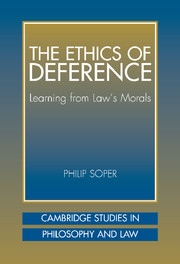2 - Understanding Authority
Published online by Cambridge University Press: 18 December 2009
Summary
Theoretical and Practical Authority
This chapter and the next consider in turn two questions about authority: (1) What do we mean by authority? (2) Does the law claim authority? Both chapters are preludes to a third question to be considered at the end of Part II: (3) Does law have authority? That these are distinct questions may not seem obvious; if, for example, law has authority, it might seem natural to suppose that legal systems necessarily claim authority. As indicated in the preface, however, I argue here not only that these are distinct questions but that they deserve distinct answers: Law has authority but does not claim it. But, though the questions are distinct, the first question concerning the nature of authority is closely connected to each of the latter two questions. That is because conclusions about whether law has or claims authority may depend on what one means by “authority.” This chapter thus begins with that question: What does one normally mean when one ascribes authority to a person or to the state?
Philosophers who discuss this question commonly begin by distinguishing theoretical from practical authority. Theoretical authority, it is usually said, is authority about facts, about what is the case; practical authority is authority about action, about what one ought to do. Theoretical authority does not provide one with new reasons for action but only with new reasons for belief (which may, of course, be relevant to action); practical authority, in contrast, provides new reasons for action.
- Type
- Chapter
- Information
- The Ethics of DeferenceLearning from Law's Morals, pp. 35 - 50Publisher: Cambridge University PressPrint publication year: 2002



